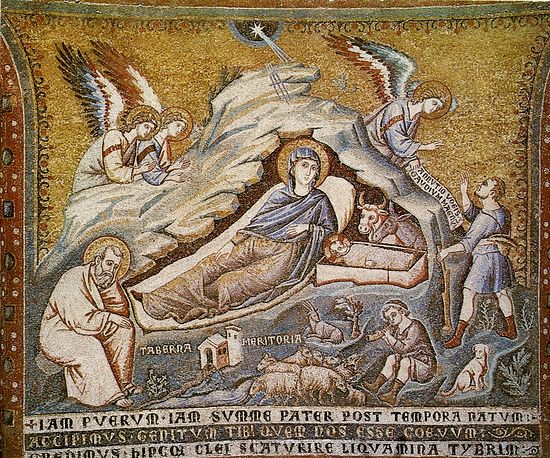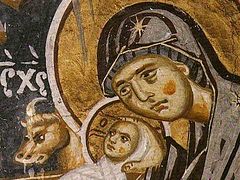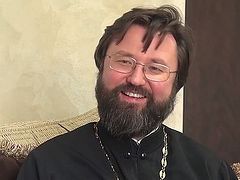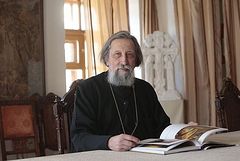The pre-holiday hysteria flares up all the more in these days around the whole world: For several months aldready, consumer rules of behavior associated with meeting the New Years and the feast of the Nativity (the Nativity—without Christ) have been imposed upon us.
News channels recently reported on the so-called Black Friday—a day of massive sales. People have trampled each other in stores, sweeping items off the shelves. From a Christian point of view, it’s terrible to imagine that preparation for the Nativity could be understood this way. Indeed, Christ is already almost entirely gone from European Christmas. For a few years already an idea has been roaming around Europe and the USA: to establish a secular holiday uniting Hanukkah and the Christian Nativity into one interreligious “festival of shopping and parties” under the name of “Chrismukkah.” In one article, journalist Yuri Maximov writes, “American authorities have wished the country ‘Happy holidays’ for several years in a row, avoiding using the word ‘Christmas,’ and on the official 2006 celebratory greeting card there was a picture of President Bush’s dog, frolicking in front of the White House. In Europe and in America, Christmas vacation is renamed “Winter Holidays,” and a Christmas tree a “Holiday Tree,” and they don’t wish “Merry Christmas,” but “Happy Holidays.”
In Russia the word “Christmas” or “Nativity” is still in use, but whose Nativity? On many modern Russian greeting cards you can read “Merry Christmas!” But Who was born is unclear.
If a modern man considers himself a Christian, then he certainly must resist such a spirit of the times; we must be very attentive to how we greet the feast of the Nativity of Christ.
The Church gives us the tradition of the Nativity Fast from ancient times. For some, it causes further difficulties, as it coincides in time with the pre-holiday hysteria. But it’s wonderful that the fast exists and gives us the possibility to properly prepare for the Nativity of Christ. Fasting during secular holidays sharpens the understanding of our position: who or what are we, weak and feeble people, with? With New Year’s, with sales, with Santa Claus, with the whole world which sets off fireworks, rejoices, and celebrates? Or are we in another place in our soul? If you reflect upon it, it turns out that we are not at all in this world to celebrate with everyone. For us, weak modern Christians, the time of the Nativity Fast is a small opportunity for personal confession before God. It allows us to see how much within us is yet secular, and how much we are yet strapped to our passions. This spiritual experience allows us to be crushed; it allows us to upbraid ourselves in weakness.
We have said that some celebrate Christmas without Christ, but sometimes Christians identify Christmas just with the Lord’s birthday. So what do we await on this feast: the appearance of God into the world, so as to endlessly feed 5,000 people? No—His appearance so as to go to the Cross, for us and for the possibility of our salvation.
Understanding the immensity of God’s gifts to us, let us, on the threshold of the feast, at least in the final days of the fast, keep away from entertainment and begin to read spiritual literature. Fellowship with the holy fathers necessarily bears fruit. King David said, “With the holy you will be holy; with the obstinate you will become depraved.” Pay heed to yourself, and then approach the Eucharistic chalice on the day of the feast with a particular spirit, even though the Liturgy is the same on this day. Sure, the church will have decorations and tinsel and will be very beautiful, but that’s not what’s important. We should meet the Nativity with the feast of the Mystical Supper. The feast does not change us all by itself; only proper preparation for it—our repentance—can change us.
Don’t think that mistakes in preparing for meeting the feast with the incarnate Christ appeared only in our times. If we take the secular traditions of the nineteenth century then we’ll see that the dogmatic essence of the feast was significantly “lightened.” Nativity was then declared as a child’s or romantic feast, as if the Nativity of Christ was just a kindergarten New Year’s performance, or a fairytale.
One of my parishioners, an adult, a respected person, wrote a poem in which he described his impressions of Nativity, with the moon, and snow, and delicious pies. The warm home atmosphere is certainly good, but we must cross over to another level of perception. Of course, we don’t have the right to deprive children of the holiday, but no adult, having truly come to the Church, needs to reconstruct a child’s Christmas for himself.
Meeting the feast, we should above all understand why Christ was born. It’s a very important question: If we remember the answer, then we will perceive the feast of the Nativity of Christ and the following days of Yuletide completely differently.
Analyzing the significance of the feast of the Nativity of Christ, we analyze the dogmatic side of the events of the Nativity of the God-Man.
Recall that knowledge of the manifestation of the Son of Man was revealed to the magi and shepherds, but this great moment was concealed from Satan. Only at the moment of the temptation of Christ did Satan try to test it: Is it Him, or not Him; has He come, or not come? When the Lord forbade demons to say that He is the Son of God, He did it for several reasons, including to give the apostles time to learn the truth. And the Cross was necessary—it’s not for nothing that the Lord says before the Cross that His time has already come. If the apostles or demons would have begun to speak about Christ openly ahead of time, more impediments would have arisen on the path of preaching. It’s not accidental that in the Paschal hymns the Lord is called cunning. Usually we use the word “cunning” when we are offended by someone, when we see his deception. In the salutatory word of the holy hierarch St. John Chrysostom on Pascha, it is said that Hell swallowed the bait: The Lord, having suffered and died on the Cross, descends into Hell, and Hell is destroyed—then the Lord leads the Old Testament righteous out of Hell. This great moment was concealed that the will of the Lord would be fulfilled, and that Satan would not be given knowledge of the time of Christ’s coming, otherwise it would hinder the redemption of mankind, for which The Lord came.
There is a very important dogmatic question in the comprehension of the essence of the feast of the Nativity of the Theotokos—the virginity of the Most Holy Theotokos. We know that in the psalms of King David it says that I was conceived in iniquities and in sins did my mother bear me. Original Sin thus passes from parents to children, when we are naturally conceived and born in passions.
Therefore, the Lord, for Whom all things are possible, chooses such an amazing and wondrous means of incarnating. Could the Lord really not just save us by His will or decision? Of course, He could have, but we wouldn’t be able to comprehend it because of our fall. If we compare ourselves with Adam, with his qualities during his time in Paradise, we will see how unlike him we are. The Lord had to become man to lead mankind out of captivity to sin; redemption was necessary; crucifixion and the shedding of His Blood to redeem us from the grip of death and Hell were necessary. His Nativity from the Virgin has, in this case, an essential meaning. The virginity of the Theotokos allows the Lord, in His human Incarnation, possessing human flesh, infirmities, the need for sleep, food, and rest, to be sinless.
At the moment of the Annunciation, when the Holy Spirit came upon the Most Holy Theotokos, an amazing, unique, and unrepeatable miracle occurred. She agreed, having received from the Archangel Gabriel the obedience to become the Mother of God, to become that door through which He would enter into this world as a man, as the God-Man. And the Holy Spirit descended upon the holy Virgin. At this moment, it’s not a normal, human, passionate conception, and it turns out that from the pure blood of the Virgin, the Lord inherits His flesh, which does not inherit Original Sin. I’ll repeat this thought: The Lord, becoming man, is not a sinner—in Him there is no sin, although He is man in essence, by nature. Had the Lord been born from a common woman, He would not be the God-Man. The uniqueness of His Nativity allowed Him to have no evil in Himself, but to be absolutely pure…





